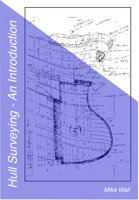Shopping cart
Search
Marine Surveying
Marine Surveying includes inspections, surveys or examinations of marine vessels to assess, monitor and report on their condition and the products on them, as well as inspections of damage caused to both vessels and cargo.
Merchant Ship Types
£51.99
Merchant Ship Types provides a broad and detailed introduction to the classifications and main categories of merchant vessels for students and cadets. It introduces the concept of ship classification by usage, cargo type, and size, and shows how the various size categories affect which ports and channels the types of vessels are permitted to enter.
Draught Surveys: A Guide to Good Practice, 2nd Edition
£30.00
The accurate measurement of dry bulk cargoes by a ship considerably minimises the risk of shortage claims and disputes. This guide outlines the methods and corrections for a draught survey to be carried out to the required accuracy. It is supported by draught measurement calculations and illustrations which show best practice.
Ship Superintendency: An Introduction, 2nd Edition
£149.00
REVISED 2ND EDITION
Commercial Ship Surveying: On/Off Hire Condition Surveys and Bunker Surveys
£87.00
Presents the first work to comprehensively describe the processes of on-hire, off-hire, and bunker surveys for dry cargo ships. Includes a companion site featuring survey checklists and Excel worksheets for select calculations (such as heavy fuel and diesel oil weight calculations). Contains accompanying illustrations and photographs to clarify key concepts.
Machinery Surveying - An Introduction
£100.00
The book contains thirteen case histories based on actual incidents which show what machinery damage investigations might look. It also covers various reporting techniques relating to such incidents.
Hull Surveying - An Introduction
£100.00
The book mainly relates to steel merchant vessels. Several types of material have also been covered which may be found on such vessels, together with GRP which is used in various other types of vessel.
Marine Surveying and Consultancy - An Introduction
£90.00
The book is aimed at those wishing to become independent marine surveyors and consultants. It covers many aspects of their work with some covered in depth. It covers different types of marine survey and marine consultancy assignment including hull damage, explosions, fire, pollution, sinkings, salvage and bunker disputes. Collisions, cargo disputes, crew injury and machinery failure are also covered with several examples.
The Ship Valuer's Handbook
£75.00
This book provides a methodical approach to the appraisal of ships within their own Class and within their trade using statistical and historical data as working tools but, most importantly, recognising the intended use of the valuation.
Marine Classification Society Surveying
£50.00
This book provides an insight into the work conducted by Marine Classification Societies, their purpose, regulation and the types of surveys carried out. Much of the information in this book concerns Class Societies’ rules and regulations for the building and continued operations of merchant ships, yachts, offshore platforms and special service crafts (including military vessels) and their work carried out in marine-related industries.
Surveying Marine Damage, 3rd Edition
£95.00
This 500-page handbook provides helpful and practical advice on all aspects of marine surveying. It will be of benefit to marine surveyors, loss adjusters, underwriters, ship owners and lawyers.
Marine Warranty Surveying - An Introduction
£112.00
The book is intended for those considering entering the marine warranty surveying discipline of marine surveying. It introduces prospective marine warranty surveyor (MWS) to the wide variety of work available.
- 1
- 2
Marine Surveying
Filter by:
Clear All


































